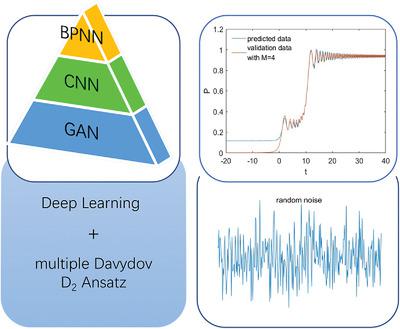当前位置:
X-MOL 学术
›
Adv. Theory Simul.
›
论文详情
Our official English website, www.x-mol.net, welcomes your
feedback! (Note: you will need to create a separate account there.)
A Deep-Learning Approach to the Dynamics of Landau–Zenner Transitions
Advanced Theory and Simulations ( IF 2.9 ) Pub Date : 2021-05-07 , DOI: 10.1002/adts.202100083 Linliang Gao 1, 2 , Kewei Sun 1 , Huiru Zheng 3 , Yang Zhao 2
Advanced Theory and Simulations ( IF 2.9 ) Pub Date : 2021-05-07 , DOI: 10.1002/adts.202100083 Linliang Gao 1, 2 , Kewei Sun 1 , Huiru Zheng 3 , Yang Zhao 2
Affiliation

|
Traditional approaches to the dynamics of the open quantum systems with high precision are often resource intensive. How to improve computation accuracy and efficiency for target systems is an extremely difficult challenge. In this work, combining unsupervised and supervised learning algorithms, a deep-learning approach is introduced to simulate and predict Landau–Zenner dynamics. Data obtained from multiple Davydov Ansatz with a low multiplicity of four are used for training, while the data from the trial state with a high multiplicity of ten are adopted as target data to assess the accuracy of prediction. After proper training, our method can successfully predict and simulate Landau–Zenner dynamics using only random noise and two adjustable model parameters. Compared to the high-precision dynamics data from multiple Davydov Ansatz with a multiplicity of ten, the error rate falls below 0.6%.
中文翻译:

朗道-齐纳跃迁动力学的深度学习方法
传统的高精度开放量子系统动力学方法通常是资源密集型的。如何提高目标系统的计算精度和效率是一个极其困难的挑战。在这项工作中,结合无监督和监督学习算法,引入了一种深度学习方法来模拟和预测 Landau-Zenner 动力学。从多个 Davydov 获得的数据使用低重数为 4 的 Ansatz 进行训练,而使用高重数为 10 的试验状态的数据作为目标数据来评估预测的准确性。经过适当的训练,我们的方法可以仅使用随机噪声和两个可调模型参数成功地预测和模拟 Landau-Zenner 动力学。与来自多个 Davydov 的高精度动态数据相比 Ansatz 的多重性为 10,错误率低于 0.6%。
更新日期:2021-07-14
中文翻译:

朗道-齐纳跃迁动力学的深度学习方法
传统的高精度开放量子系统动力学方法通常是资源密集型的。如何提高目标系统的计算精度和效率是一个极其困难的挑战。在这项工作中,结合无监督和监督学习算法,引入了一种深度学习方法来模拟和预测 Landau-Zenner 动力学。从多个 Davydov 获得的数据使用低重数为 4 的 Ansatz 进行训练,而使用高重数为 10 的试验状态的数据作为目标数据来评估预测的准确性。经过适当的训练,我们的方法可以仅使用随机噪声和两个可调模型参数成功地预测和模拟 Landau-Zenner 动力学。与来自多个 Davydov 的高精度动态数据相比 Ansatz 的多重性为 10,错误率低于 0.6%。











































 京公网安备 11010802027423号
京公网安备 11010802027423号